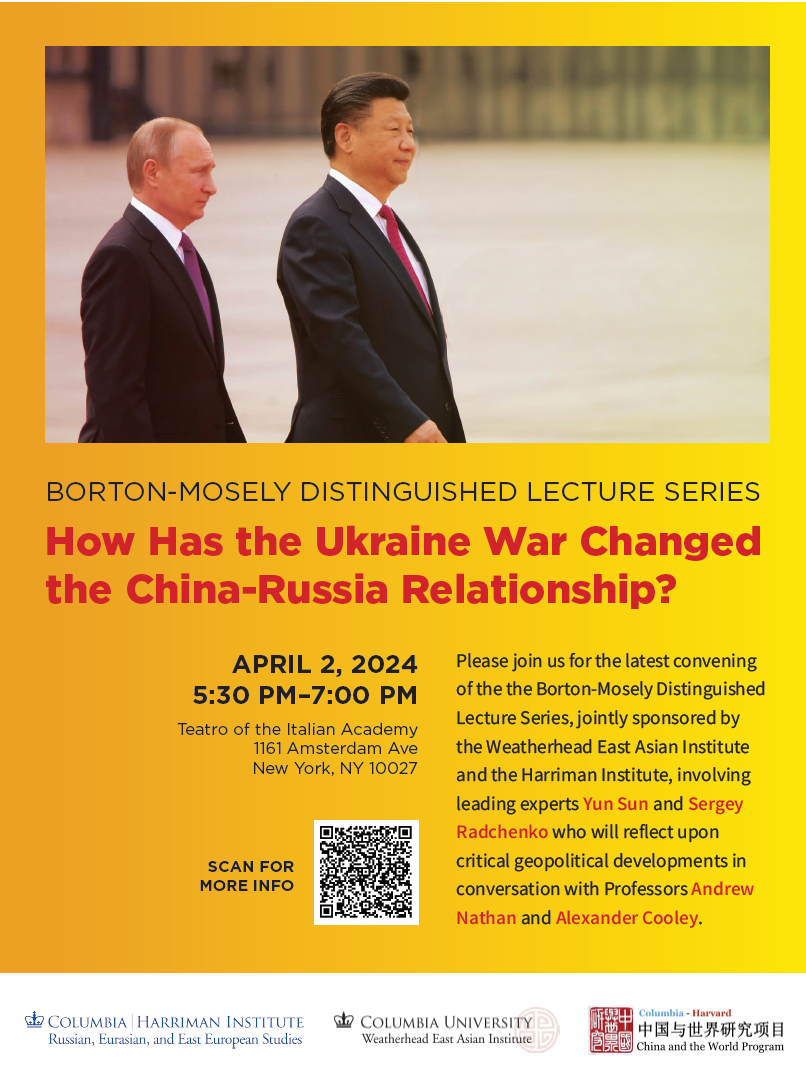Please join us for the latest convening of the the Borton-Mosely Distinguished Lecture Series, jointly sponsored by the Weatherhead East Asian Institute and the Harriman institute, involving leading experts Yun Sun and Sergey Radchenko who will reflect upon these critical geopolitical developments in conversation with Professors Andrew Nathan and Alexander Cooley.
Speakers:
Yun Sun, Senior Fellow and Co-Director China, East Asia, Stimson Center
Sergey Radchenko, Wilson E. Schmidt Distinguished Professor, Johns Hopkins School of Advanced International Studies
Opening Remarks:
Andrew J. Nathan, Class of 1919 Professor of Political Science, Department of Political Science, Columbia University
Moderator:
Alexander Cooley, Vice Provost for Research, Libraries, and Academic Centers; Barnard College; Claire Tow Professor of Political Science, Barnard College; Harriman Institute, Columbia University
Just prior to Russia’s invasion of Ukraine in February 2022, Russian President Vladimir Putin and Chinese President Xi Jinping proclaimed a “no-limits” partnership between their countries. But Russia’s war in Ukraine has had a profound impact on the Sino-Russian relationship. While Putin has sought Beijing’s support for his territorial grab, China’s position, has been famously characterized as “pro-Russia neutrality”.
Geopolitics remains the single most important factor in China’s decision regarding the Ukraine war, as Beijing has been torn between the competing agendas of managing its relations with Russia and relations with Europe. And while the Russians have grown increasingly frustrated with what many in Moscow perceive as Beijing’s double-dealing and unwillingness to commit, Putin’s leverage with Xi Jinping remains limited. As the war in Ukraine grinds into its third year, China and Russia continue unsteadily towards an ever closer alignment even while pragmatically looking out for their own interests in an evolving world.
Speakers' Bios:
Yun Sun is a Senior Fellow and Co-Director of the East Asia Program and Director of the China Program at the Stimson Center. Her expertise is in Chinese foreign policy, U.S.-China relations and China’s relations with neighboring countries and authoritarian regimes. From 2011 to early 2014, she was a Visiting Fellow at the Brookings Institution, jointly appointed by the Foreign Policy Program and the Global Development Program, where she focused on Chinese national security decision-making processes and China-Africa relations. From 2008 to 2011, Yun was the China Analyst for the International Crisis Group based in Beijing, specializing on China’s foreign policy towards conflict countries and the developing world. Prior to ICG, she worked on U.S.-Asia relations in Washington, DC for five years. Yun earned her master’s degree in international policy and practice from George Washington University, as well as an MA in Asia Pacific studies and a BA in international relations from Foreign Affairs College in Beijing.
Sergey Radchenko is the Wilson E. Schmidt Distinguished Professor at the Johns Hopkins School of Advanced International Studies. He has written extensively on the Cold War, nuclear history, and on Russian and Chinese foreign and security policies. He has served as a Global Fellow and a Public Policy Fellow at the Woodrow Wilson Centre and as the Zi Jiang Distinguished Professor at East China Normal University (Shanghai). Professor Radchenko’s books include To Run the World: the Kremlin’s Cold War Bid for Global Power (Cambridge UP, forthcoming in 2024), Two Suns in the Heavens: the Sino-Soviet Struggle for Supremacy (Wilson Center Press & Stanford UP, 2009), and Unwanted Visionaries: the Soviet Failure in Asia (Oxford UP, 2014). Professor Radchenko is a native of Sakhalin Island, Russia, was educated in the US, Hong Kong, and the UK, where he received his PhD in 2005 (LSE). Before he joined SAIS, Professor Radchenko worked and lived in Mongolia, China, and Wales.
This event is hosted by the Weatherhead East Asian Institute and the Harriman institute, and cosponsored by China and the World Program at Columbia University.
Registration: To attend this event in-person, please register HERE.
Contact Information
Julie Kwan
[email protected]

